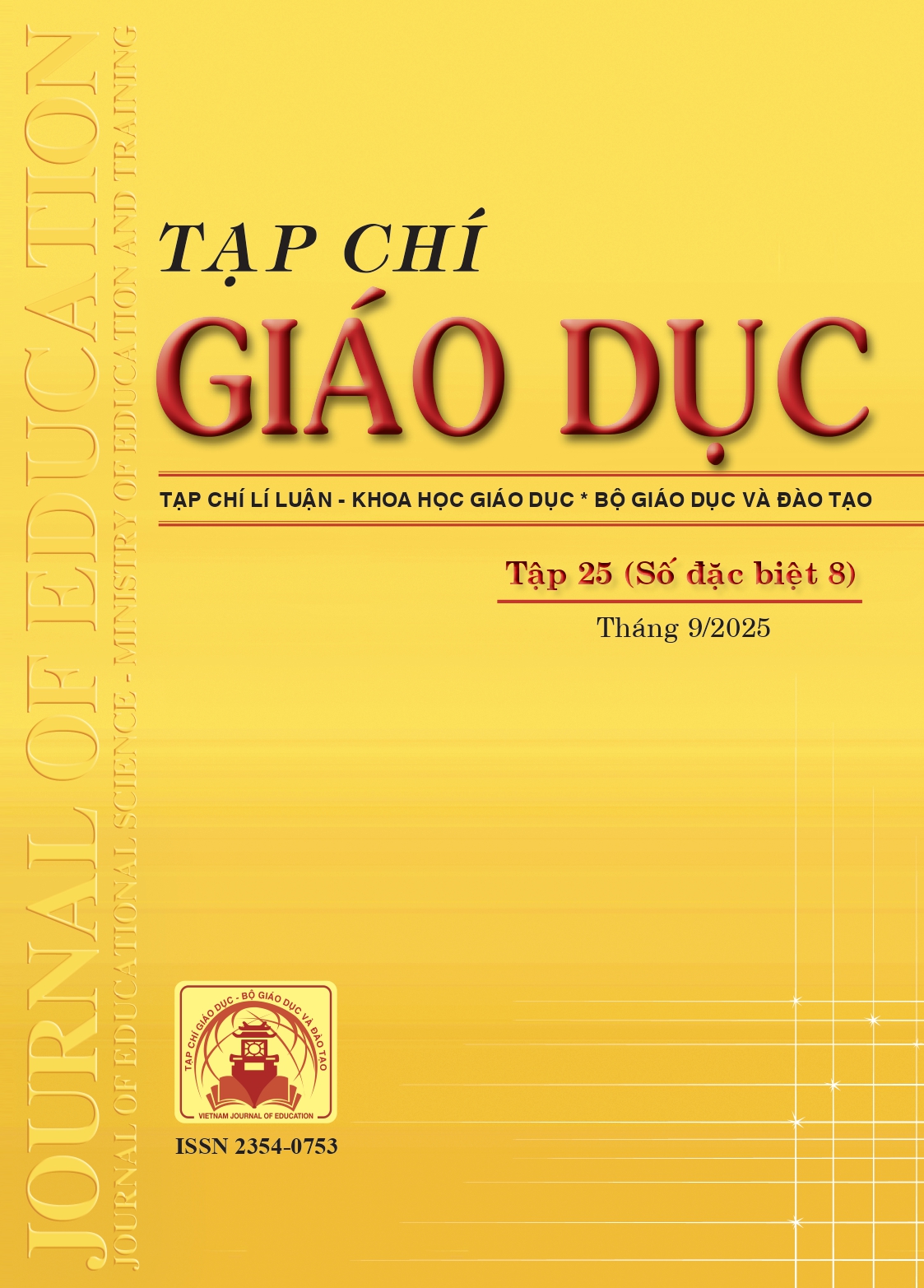Thiết kế và sử dụng câu chuyện giáo dục phòng tránh thiên tai cho học sinh tiểu học trong dạy học môn Tự nhiên và Xã hội 2
Tóm tắt
Disaster prevention education plays an important role in the education and development of primary school students. This content not only provides the necessary knowledge and skills to ensure safety for students but also contributes to forming a proactive awareness, a calm attitude in handling situations and a sense of responsibility in protecting themselves and supporting others. Disaster prevention education is included in the content of the Natural and Social Sciences Program for grade 2 in primary school. Based on the analysis of the role of stories in teaching disaster prevention content for Natural and Social Sciences for grade 2, the article proposes a process for designing and using stories in teaching this content, and at the same time provides specific illustrative examples for primary school teachers to effectively apply in teaching practice. The study provides specific pedagogical suggestions in designing and using stories as a visual tool, helping teachers improve awareness and disaster prevention skills for primary school students.
Tài liệu tham khảo
Akarsu, B., Kariper, A., & Coşkun, H. (2015). The effect of using scientific stories on teaching science and on the academic achievement of the students. Mersin Üniversitesi Eğitim Fakültesi Dergisi, 11(2), 349-365. https://doi.org/10.17860/efd.04596
Bộ GD-ĐT (2018). Chương trình giáo dục phổ thông môn Tự nhiên và Xã hội (ban hành kèm theo Thông tư số 32/2018/TT-BGDĐT ngày 26/12/2018 của Bộ trưởng Bộ GD-ĐT).
Đỗ Thị Nguyên Tiêu (2025). Thực trạng giáo dục kĩ năng ứng phó với biến đổi khí hậu và phòng tránh thiên tai cho học sinh ở trường phổ thông dân tộc bán trú các tỉnh trung du và miền núi phía Bắc. Tạp chí Khoa học, Trường Đại học Trưng Vương, 1(1), 60-70.
Kousky, C. (2016). Impacts of Natural Disasters on Children. The Future of Children, 26(1), 73-92. https://doi.org/10.1353/foc.2016.0004
Mutonyi, H. (2016). Stories, proverbs, and anecdotes as scaffolds for learning science concepts. Journal of Research in Science Teaching, 53(6), 943-971. https://doi.org/10.1002/tea.21255
Newby, P. (2014). Research methods for education. Routledge.
Nguyễn Minh Giang, Nguyễn Thị Ngọc Bích (2013). Tích hợp giáo dục phát triển bền vững trong chủ đề “Trái đất và bầu trời” môn Tự nhiên và Xã hội lớp 2 theo phương pháp dạy học dựa trên dự án. Tạp chí Giáo dục, 23(4), 18-20.
Nguyễn Quang Hùng, Hứa Mỹ Linh (2022). Kết hợp xây dựng câu chuyện và trò chơi toán học trong dạy học môn Toán lớp 3, 4. Tạp chí Khoa học, Trường Đại học Đồng Tháp, 11(4), 41-50.
Pasupathi, M., & Billitteri, J. (2015). Being and becoming through being heard: Listener effects on stories and selves. International Journal of Listening, 29(2), 67-84. https://doi.org/10.1080/10904018.2015.1029363
Quynh, P. V., Dung, N. T., & Phuong, D. M. (2024). Designing an educational comic on gender for students in the human and health topic of grade 5 Science. Educational Sciences, HNUE Journal of Science, 69(3), 108-118. https://doi.org/10.18173/2354-1075.2024-0052
Rowcliffe, S. (2004). Storytelling in Science. School Science Review, 86(314), 121-126.
Từ Phương Anh, Trần Ánh Dương, Vũ Thị Diễm Quỳnh, Tưởng Duy Hải (2023). Xây dựng câu chuyện Vật lí hỗ trợ dạy học chuyên đề Trường hấp dẫn. Tạp chí Khoa học, Trường Đại học Vinh, 52(3C), 75-84.
Urgesi, C., Mattiassi, A. D., Buiatti, T., & Marini, A. (2016). Tell it to a child! A brain stimulation study of the role of left inferior frontal gyrus in emotion regulation during storytelling. NeuroImage, 136, 26-36. https://doi.org/10.1016/j.neuroimage.2016.05.039
Đã Xuất bản
Cách trích dẫn
Số
Chuyên mục
Giấy phép

Tác phẩm này được cấp phép theo Ghi nhận tác giả của Creative Commons Giấy phép quốc tế 4.0 .












